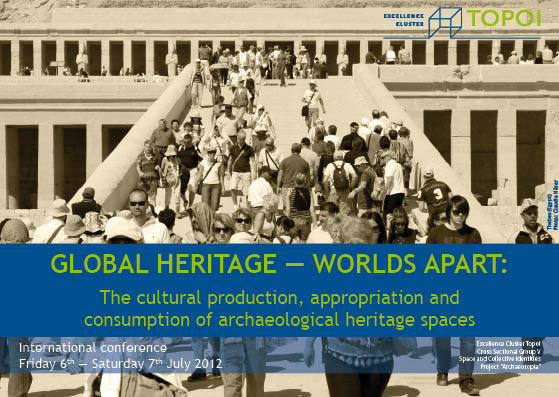for a detailed program, see -> here
Archaeological heritage spaces attract the interest and involvement of a wide range of individuals and social groups, such as archaeologists and other heritage professionals, tourism entrepreneurs, international and national tourists, politicians, members of local communities etc. Their interplay sets off multiple processes of voicing, negotiating, mixing and interlinking cultural concepts and practices, which in turn shape the trajectory of the archaeological spaces. While recent research has developed and adopted concepts like “heritagisation’ and “transculturality’ to grasp these phenomena, little work has been done to systematically describe and analyse such processes in relation to archaeological heritage sites in non-western contexts. Barbara Kirshenblatt-Gimblett defines heritage as a mode of cultural production that has recourse to the past and produces something new. But heritagisation can also be seen as a process of turning lived practices and lived-in materialities into “heritage’, transposing them into an alienated heritage sphere with its own standards and operations. Recent work on the global spread of museums and their hybridisation, i.e. transformation which their concept experiences in non-western spheres, may serve as a parallel to assess these processes. Likewise, Byung-Chul Han’s concept of “hyperculturality’, denoting an exponential diffusion of cultural practices and forms of expression and the dissolution of cultural boundaries, seems particularly suited to the analysis of phenomena witnessed in these contexts.
While the proclamation of “heritage status’ alone can turn archaeological places into an arena of manifold political and cultural expressions, these same places are often additionally subjected to severe physical transformations. Usually, archaeologists and other heritage professionals claim and enjoy privileged access to archaeological sites for the sake of research and preservation. Based on the logics of their expert cultures, they introduce operations and regulations, which aim at a “correct’ handling of archaeological sites as spaces sui generis worldwide and thus exert strongly homogenizing tendencies. One major instrument in the dissemination of the heritage concept is the UNESCO world heritage scheme. As it adds to the universal claims of much heritage practice, it is worth investigating its dynamics on various national and local levels.
In adopting the notion of “cultural heritage’, archaeological spaces are perceived as crucial localities for the (re)production of knowledge and the construction, presentation and negotiation of collective identities also by other stakeholders. Accordingly they can be impregnated with very divergent messages or adapted for intensive ideological or commercial exploitation. Much heritage research underlines the importance of heritage places as an economic factor in the context of international and national tourism and sustainable development. However, interventions into archaeological places necessarily undermine their complex processual character in favor of creating static “Lebenswelt’ tableaux, which abridge the complexity of the archaeological record and result in homogenizing presentations of the past. Thus, extremely heterogeneous archaeological sites are adjusted to converging procedures of appropriation, which facilitate the contact of versed visitors with a temporally as well as culturally distant material world, but seriously deny the allegedly “authentic’ nature of processed material relics of the past. Exploring an archaeological site on a foreign continent can become easier than plunging into a socially unfamiliar lived environment next door. These distinct routines make tourist visits a social practice sui generis, detaching the visited space from any social practices to which it may have been previously connected.
Within these outlines, the conference aims to discuss methodological approaches and select case studies addressing the complex processes which arise from the production, appropriation and consumption of archaeological heritage spaces. Its regional focus is on northern Africa and the Near East, i.e. settings where the concepts of “global heritage’ and “archaeological place’ and the ensuing practices are ideational imports whose adoption and transformation result in particularly vibrant analytical constellations – as many recent examples show.
6.7.2012 | |
09:30 - 09:40 | Welcome address Gerd Graßhoff |
09:40 - 10:00 | Introduction Stefan Altekamp Cornelia Kleinitz Claudia Näser |
10:00 - 10:45 | The production and consumption of heritage spaces between the local and the global Sybille Frank |
10:45 - 11:30 | Transnational world heritage constructions Gabriele Dolff-Bonekämper |
12:00 - 12:45 | The politics of the UNESCO world heritage scheme Thomas Schmitt |
12:45 - 13:30 | Authenticity and global archaeology Stefan Altekamp |
15:00 - 15:45 | Globalization and localization of the museum concept Christina Kreps |
15:45 - 16:30 | The trace and the token. Artifacts and tourist lives Michael Haldrup Pedersen |
15:45 - 16:30 | Heritage spaces and development policies Sophia Labadi |
17:00 - 17:45 | Unsettling assumptions about community engagement Bryony Onciul |
17:45 - 18:30 | Discussion Michael Rowlands |
7.7.2012 | |
09:30 - 10:15 | World heritage and the wooden hut: Re-traditionalizing the archaeological park of Angkor/Cambodia Michael Falser |
10:15 - 11:00 | Archaeology, polity and the city: Third Carthage as a contested space Stefan Altekamp Mona Khechen |
11:30 - 12:15 | Detachment and attachment: Hypercultural Thebes (Egypt) Claudia Näser |
12:15 - 13:00 | One landscape many tenants: Uncovering multiple claims, visions and meanings on the Theban Necropolis Monica Hanna Gemma Elisabeth Tully |
14:30 - 15:15 | Spaces in development: Making and unmaking Sudan’s heritage Cornelia Kleinitz |
15:15 - 16:00 | Baalbek: The impact of change of scientific and local cultural approaches on a World Heritage site Margarete van Ess |
16:30 - 17:15 | Palestinian/Israeli heritage in conflict: From "kitchen conversations’ to "coalitional politics" Maria Theresia Starzmann |
17:15 - 18:00 | Heritage void and the void as heritage: Bamiyan Reinhard Bernbeck |
18:00 - 19:00 | Discussion Susan Pollock |

